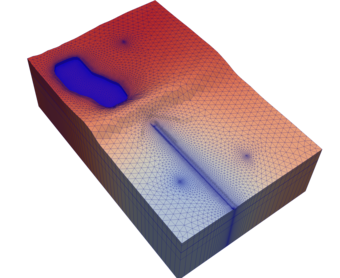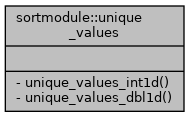Definition at line 15 of file sort.f90.
◆ unique_values_dbl1d()
| subroutine sortmodule::unique_values::unique_values_dbl1d |
( |
real(dp), dimension(:), intent(in), allocatable |
a, |
|
|
real(dp), dimension(:), intent(inout), allocatable |
b |
|
) |
| |
|
private |
Definition at line 329 of file sort.f90.
331 real(DP),
dimension(:),
allocatable,
intent(in) :: a
332 real(DP),
dimension(:),
allocatable,
intent(inout) :: b
334 integer(I4B) :: count
336 integer(I4B),
dimension(:),
allocatable :: indxarr
337 real(DP),
dimension(:),
allocatable :: tarr
342 allocate (tarr(
size(a)))
343 allocate (indxarr(
size(a)))
352 call qsort(indxarr, tarr, reverse=.true.)
357 if (tarr(n) > tarr(n - 1)) count = count + 1
361 if (
allocated(b))
then
370 if (tarr(n) > b(count))
then
◆ unique_values_int1d()
| subroutine sortmodule::unique_values::unique_values_int1d |
( |
integer(i4b), dimension(:), intent(in), allocatable |
a, |
|
|
integer(i4b), dimension(:), intent(inout), allocatable |
b |
|
) |
| |
|
private |
Definition at line 277 of file sort.f90.
279 integer(I4B),
dimension(:),
allocatable,
intent(in) :: a
280 integer(I4B),
dimension(:),
allocatable,
intent(inout) :: b
282 integer(I4B) :: count
284 integer(I4B),
dimension(:),
allocatable :: indxarr
285 integer(I4B),
dimension(:),
allocatable :: tarr
290 allocate (tarr(
size(a)))
291 allocate (indxarr(
size(a)))
300 call qsort(indxarr, tarr, reverse=.true.)
305 if (tarr(n) > tarr(n - 1)) count = count + 1
309 if (
allocated(b))
then
318 if (tarr(n) > b(count))
then
The documentation for this interface was generated from the following file:
- /home/runner/work/modflow6/modflow6/src/Utilities/sort.f90


